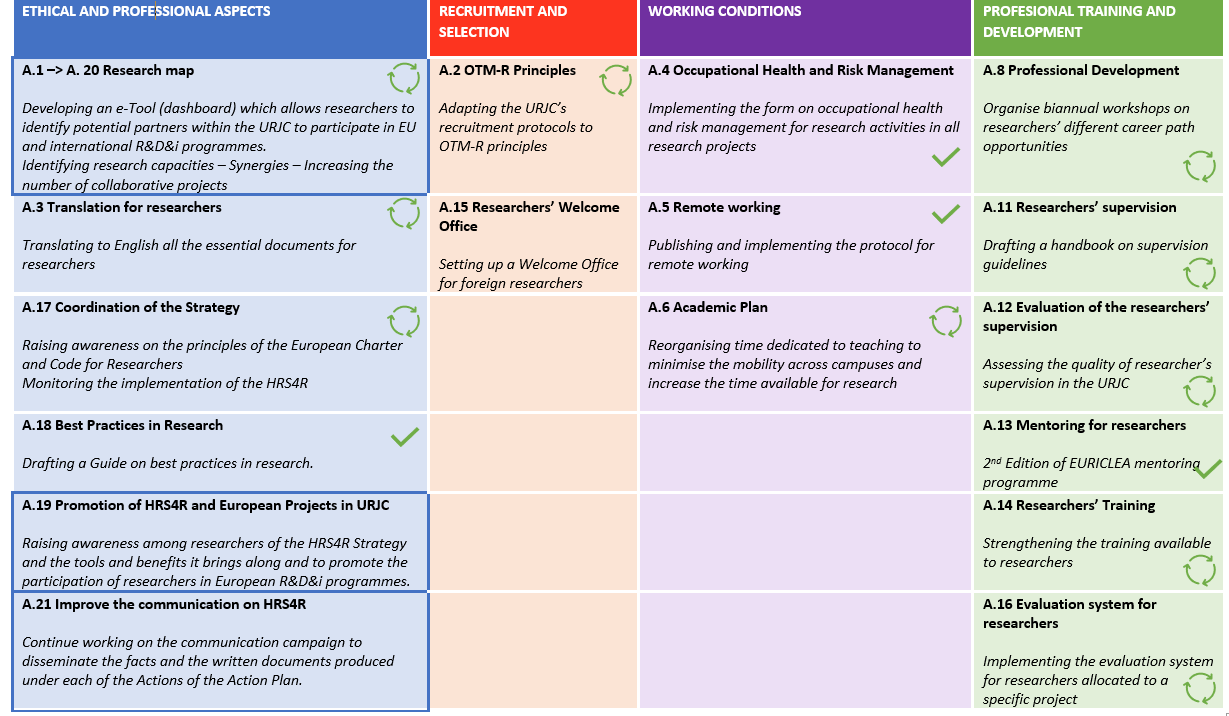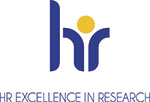HRS4R STRATEGY
HRS4R Strategy
The Human Resources Strategy for Researchers (HRS4R) is a tool launched by the European Commission to support research institutions and organizations financing research with the aim to apply the European Charter for Researchers and the Code of Conduct for the Recruitment of Researchers. The URJC endorsed these legal instruments in September 2018.
The HRS4R Strategy aims to attract and keep research talent in Europe, promote the mobility of researchers and ensure a good working environment for researchers to foster the development of their careers in research. The objective of the Strategy is also to increase the employability of researchers and an economic growth in research through the establishment of a competitive, transparent and open work market.
To that end, the URJC makes the commitment, in agreement with its internal policies, to develop a human resources strategy which aligns with the recommendations and principles of the Charter and the Code for Researchers and which guarantees the transparency, accessibility, equality of opportunities and search for excellence in the recruitment of researchers.
European Charter for Researchers
The European Charter for Researchers adopted on 18 December 2023 replaces the European Charter and Code for Researchers of 2005.
Both the 2023 European Charter and the 2005 European Charter and Code for Researchers are a recommendation of the European Commission to Member States, which are invited to apply them on a voluntary basis. The 2023 European Charter for Researchers merges the 2005 European Charter, setting the general principles and requirements defining the obligations and rights of both researchers and those employing and/or financing them, and the --, highlighting the significance that recruitment procedures are open, transparent and based on merits.
This way, the 2023 European Charter for Researchers encompasses the rights and responsibilities of researchers, employers, funders and policy makers. It consists of 20 key principles classified under the following four pillars:
- Ethics, Integrity, Gender and Open Science;
- Researchers' Assessment, Recruitment and Progression;
- Working Conditions and Practices;
- Research Careers and Talent Development.
The Charter for Researchers is directed at all researchers, research performing sectors and respective umbrella organizations (stakeholders).
HRS4R Award
In July 2020, after the European Commission approved the URJC's Action Plan to ensure the implementation of the principles of the European Charter and Code for Researchers, the URJC was granted the HRS4R Award. This Award identifies the institutions which generate and support the existence of a stimulating environment which enhances research.
Up to date, 725 organizations, 166 of them Spanish, have been granted the Award.
Who is the Strategy for?
The HRS4R Strategy is for all URJC researchers, whether they are from Spain or other countries, regardless of their contractual relationship and the point at which their professional career is. According to the European Commission a researcher's career goes through four stages. For each of these, the Commission has established a profile with a framework of competencies. These profiles are described in the tabs below.
- R1-FIRST STAGE RESEARCHER
- R2-RECOGNIZED RESEARCHERS
- R3-ESTABLISHED RESEARCHERS
- R4-LEADING RESEARCHERS
- R1-FIRST STAGE RESEARCHER
- R2-RECOGNIZED RESEARCHERS
- R3-ESTABLISHED RESEARCHERS
- R4-LEADING RESEARCHERS
R1-FIRST STAGE RESEARCHER
First stage researchers are those who are at the beginning of their research careers up to the point of holding a PhD. They are those who carry out research under close supervision. Their competencies are the following:
- Carry out research under supervision.
- Have the ambition to develop knowledge of research methodologies and discipline.
- Have demonstrated a good understanding of a field of study.
- Have demonstrated the ability to produce data under supervision.
- Be capable of critical analysis, evaluation and synthesis of new and complex ideas.
- Be able to explain the outcome of research (and value of it) to research colleagues.
- Ideally, R1 researchers develop integrated language, communication and environment skills, especially in an international context.
R2-RECOGNIZED RESEARCHERS
Recognized researchers are those who hold a Doctorate degree (PhD) or who have an equivalent level of experience and competences. In addition to the skills required from first stage researchers (R1), a recognized researcher (R2):
- You have demonstrated a systematic understanding of a field of study and mastery of research associated with that field.
- You have demonstrated the ability to conceive, design, implement and adapt a substantial program of research with integrity.
- You have made a contribution through original research that extends the frontier of knowledge by developing a substantial body of work, innovation or application. This could merit national or international refereed publication or patent.
- Can explain the outcome of their research and value of it to the research community.
- Takes ownership for and manages own career progression, sets realistic and achievable career goals, identifies and develops ways to improve employability.
- Co-authors papers at workshops and conferences.
Furthermore, R2 researchers should also have the following desirable competencies:
- Understands the agenda of industry and other related employment sectors.
- Understands the value of their research work in the context of products and services from industry and other related employment sectors.
- Can communicate with the wider community, and with society generally, about their areas of expertise.
- Can mentor First Stage Researchers (R1), helping them to be more effective and successful in their R&D trajectory.
R3-ESTABLISHED RESEARCHERS
Established researchers are those who hold a PhD (or have equivalent experience and competencies) and who can carry out their research with a considerable degree of independence. In addition to the competencies of R1 and R2 researchers, an established researcher (R3):
- You have an established reputation based on research excellence in your field.
- Makes a positive contribution to the development of knowledge, research and development through co-operations and collaborations.
- Identifies research problems and opportunities within their area of expertise.
- Identifies appropriate research methodologies and approaches.
- Conducts research independently which advances a research agenda.
- Can take the lead in executing collaborative research projects in cooperation with colleagues and project partners.
- Publishes papers as lead author, organizes workshop or conference sessions.
The following are desirable competencies that could be expected from an R3 researcher:
- Establishes collaborative relationships with relevant industry research or development groups.
- It is innovative in their approach to research.
- Can form research consortia and secure research funding / budgets / resources from research councils or industry.
- Is committed to professional development of his/her own career and acts as a mentor for others.
R4-LEADING RESEARCHERS
Leading researchers have a leading role in their area of expertise. Normally, this researcher profile includes the team leader of a research group or head of an industry R&D laboratory; however, in particular disciplines as an exception, leading researchers may include individuals who operate as lone researchers without a team.
Leading researchers (R4), as they are culminating their research career, should have the competences included in the other researcher profiles (R1, R2 and R3) and, in addition, the following:
- An international reputation based on research excellence in their field.
- Demonstrated critical judgment in the identification and execution of research activities.
- Making a substantial contribution (breakthroughs) to their research field or spanning multiple areas.
- Developing a strategic vision on the future of the research field.
- Recognizing the broader implications and applications of their research.
- Publishing and presenting influential papers and books.
- Participating in workshop and conference organizing committees and delivering invited talks.
Ideally, it is also expected from an R4 researcher that:
- He is an expert at managing and leading research projects.
- He is skilled at managing and developing others.
- You have a proven record in securing significant research funding / budgets / resources.
- Beyond team building and collaboration, focusing on long-term team planning (eg career paths for the researchers and securing funding for the team positions).
- He is an excellent communicator and networker within and outside the research community [creating networks].
- It is able to create an innovative and creative environment for research.
- Acts as a professional development role model for others.
HRS4R STRATEGY AT URJC
Revised Action Plan after the Interim Assessment
In July 2022, URJC submitted to the European Commission the Internal Review for Interim Assessment report analyzing the progress and achievements made in the 18 actions launched under the initial Action Plan (2020-2022). After analyzing the URJC's report, in November 2022 the European Commission issued its Interim Assessment Consensus Report indicating that the URJC had correctly and fully implemented the Human Resources Strategy for Researchers (HRS4R). With the Commission's recommendations, the URJC has launched its Revised Plan (2023-2025), focusing on strengthening communication actions to raise awareness among the research community about the tools that the HRS4R Strategy makes available to them.
In November 2025 the URJC will issue its final evaluation report and the European Commission will visit the institution for the purpose of the renewal of the HRS4R Award.
The table below shows the actions of the initial Action Plan that are still ongoing and the new actions (19. 20, 21) that have been launched in view of the 2025 evaluation:



